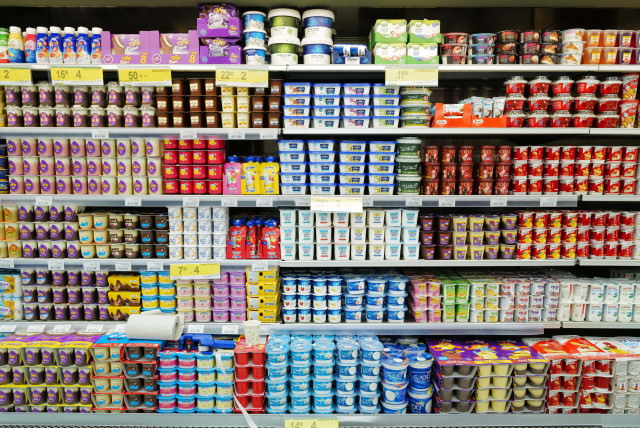Smotrich’s last-second push to curb Israeli dairy price hike breaks industry agreement

The move may lead to a shortage of certain dairy staples in Israel as the Jewish holiday of Shavuot approaches.
The cost of price-controlled dairy products in Israel such as milk and sour cream is set to rise by 9% on Monday.
This increase is only half of what was announced earlier this week, the result of a last-minute deal with the Agriculture Ministry cut by Finance Minister Bezalel Smotrich, who sprang into action days before the long-expected price rise was to occur.
According to the new decree drafted by Smotrich and Agriculture Minister Avi Dichter on Thursday, the price hike will only reflect the increase in dairy production costs, and will defer outstanding reimbursements owed to the dairy industry for similar moves in the past.
It is expected that these reimbursements will be paid over the next three years – meaning that the finance minister has merely kicked the can down the road, and will be faced with the obligation to pay the pipers (or milkers, as it were) once again in November 2023.
The rise in the cost of milk is primarily due to two main factors, the first of which is related to ongoing expenditures incurred by dairies, such as increased livestock feed prices as a result of the war in Ukraine.
The second factor is the retroactive reimbursement of income owed to dairies for similar occurrences in the past, which they had to absorb. Smotrich’s move with Dichter essentially acts to compensate for the former while deferring the latter until a later date.
According to Dr. Avichai Snir, an expert from the Department of Economics at Bar-Ilan University, it’s unclear whether or not the Finance Ministry will ever need to make good on those reimbursements, as there’s currently no set precedent that dictates a specific limit to how many times the hot potato can be passed on before it must be paid off in full.
“Usually, the finance ministers always sign eventually, but I think we’re in a new territory. They can theoretically put it off perpetually, forever. What the finance minister hopes for when making a move like this is that something will happen in the world and the price of milk will come down,” at which point it will be easier to settle all the necessary debts, Snir explained.
This state of perpetual payback limbo puts Israel’s dairy manufacturers in an uncomfortable position, however, and they don’t have much recourse. “Especially now, the only thing that can happen is the dairies will take the government to court. And then I don’t think the government has a good case,” Snir said.
Indeed, Israel’s dairy manufacturers are opposed to Smotrich’s move and are examining its legality, as it is in direct violation of an industry agreement signed at the beginning of the year by former finance minister Avigdor Liberman.
That agreement would revise dairy prices automatically every six months in a system similar to that which dictates the price of gas, without relying on a signature of approval from the finance minister, as it has until now.
“The market is very inefficient,” said Snir, who explained that until recently it has been run in the same, convoluted, committee-laden way for the past half-century at least. “It was never very clear whether they can use their own discretion in making the decision to sign or not.”
Assuming the dairies do take legal action, Smotrich will need to answer to the court system, though that outcome may be just as well as he could leverage the situation to further justify the government’s intended judicial overhaul.
In light of the dairies’ dissatisfaction with the minister’s decision, the Prime Minister’s Office is expected to step into the fray and sort things out with the parties involved.
Why is it more expensive, anyway?
Analysts have suggested that the move will result in a shortage of price-controlled dairy products, as manufacturers choose instead to produce those for which they can charge an appropriate price. A similar phenomenon was witnessed recently, when price regulation issues led to a shortage of locally produced butter, leaving consumers no option but to choose from a spectrum of pricier imports.
As Snir put it: “If you keep the price to the consumer constant, while you increase the price to the producer, then you won’t be surprised to find that there are several products that are not produced.”
Jerusalem Post Store
`; document.getElementById("linkPremium").innerHTML = cont; var divWithLink = document.getElementById("premium-link"); if (divWithLink !== null && divWithLink !== 'undefined') { divWithLink.style.border = "solid 1px #cb0f3e"; divWithLink.style.textAlign = "center"; divWithLink.style.marginBottom = "15px"; divWithLink.style.marginTop = "15px"; divWithLink.style.width = "100%"; divWithLink.style.backgroundColor = "#122952"; divWithLink.style.color = "#ffffff"; divWithLink.style.lineHeight = "1.5"; } } (function (v, i) { });


